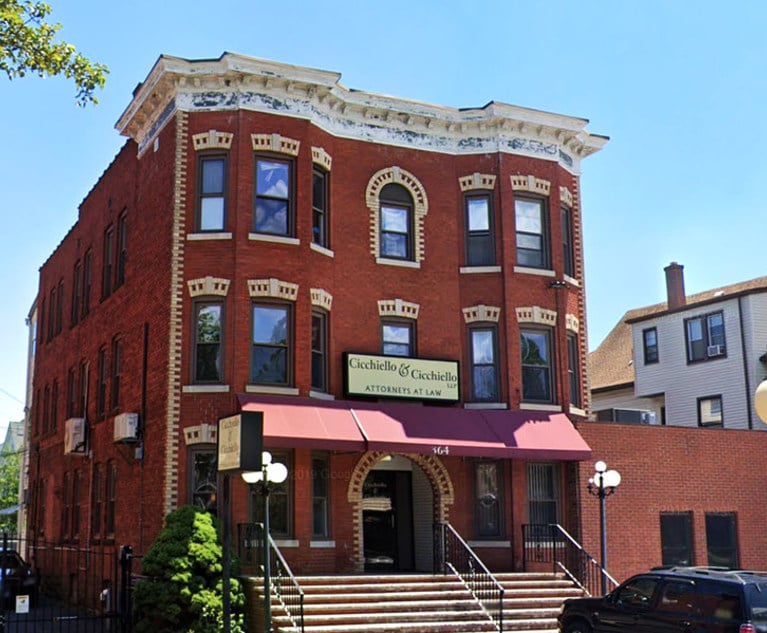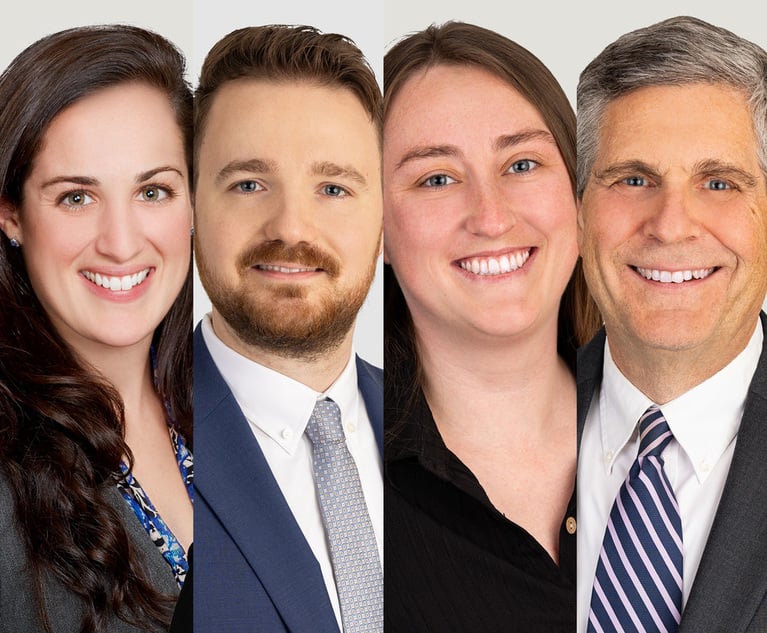 Attorney Thomas Fortune Fay. Photo by Diego M. Radzinschi
Attorney Thomas Fortune Fay. Photo by Diego M. RadzinschiBeating Terrorists Where It Hurts Most—Their Wallets
Thomas Fortune Fay, the Washington, D.C.-based attorney, has secured billions of dollars in damages for families of terror victims.
October 26, 2018 at 03:16 PM
5 minute read
When a U.S. citizen is injured, or worse, in an act of international terror, recompense is possible, thanks in large part to Thomas Fortune Fay.
The Washington, D.C.-based attorney who has secured billions of dollars in damages for families of terror victims acknowledged in an interview with the Connecticut Law Tribune this week that he has been following international news surrounding murdered journalist and U.S. resident Jamal Khashoggi, and that he would gladly get involved on the civil side of the case.
In the meantime, he will discuss his work at the next Leaders in Law lecture Nov. 8 at the American Museum of Tort Law in Winsted, Connecticut.
Khashoggi was attempting to secure paperwork in order to remarry when he was assassinated inside the Saudi consulate in Istanbul, Turkey, by a team of Saudi security personnel, according to reports. The Washington Post reports that, after repeated denials and changes to their story, Saudi officials have acknowledged the murder was premeditated.
“This is just as much of a violation of international law as it would be if a guy went in to rob a bank and shot the teller,” Fay said of the alleged murder, which reportedly involved a 15-member assassination team. “If you do that, you're going to get punished. That has to be the message. I don't have any doubt these guys were acting under instructions of the crown prince [Mohammed bin Salman].”
Fay's work getting justice for individuals and families victimized by terrorism dates back nearly a quarter of a century to the case of murdered American college student Alisa Flatow, who was killed in a suicide attack on a passenger bus in Israel on April 10, 1995. Working with the victim's father, attorney Stephen Flatow, Fay helped usher in legislation allowing victim's families to hold state sponsors of terrorism liable for damages. In 1998, a U.S. court found the Islamic Republic of Iran guilty of funding the group responsible for Alisa Flatow's death, Palestinian Islamic Jihad, awarding Stephen Flatow more than $225 million.
Fay recalled making several trips to Israel and other overseas locations to build this and other cases, meeting key informants along the way who pointed out attachable foreign assets hidden in the United States. Working with Israeli intelligence, counsel was able to determine that a call had been made from Iran to the perpetrator of the Flatow attack, and he had “foolishly bragged” about his involvement before the bombing.
In another instance, while attending hearings on Capitol Hill, Fay was approached by a confidential source who helped him uncover additional foreign-held assets in the United States. Through exceptions to jurisdictional immunity of foreign states under the Foreign Intelligence Surveillance Act, Fay ultimately was able to secure a $2.16 billion judgment against Iran in 2012 for family members and victims of the 1983 Beirut barracks bombing.
In 2002, Fay received a special commendation from the Civil Justice Foundation for securing more than $9 billion in judgments for victims of international terrorism. And last year, Fay and his daughter, Caragh Fay, a partner of the Fay Law Group, were presented with the David S. Shrager President's Award from the American Association for Justice, recognizing their work on behalf of victims of foreign state-sponsored terrorism.
The Iranian government, meanwhile, calls Fay “a gangster lawyer,” which he said he sees as “a high compliment.”
Billed as “part interview, part master class and part town hall meeting,” Fay's Nov. 8 talk in Connecticut will be a reunion of sorts for Fay and friend Ralph Nader, founder of the American Museum of Tort Law. Fay recalled flying back from a trial lawyers' conference in San Francisco years ago with Nader, who secured fellow passengers “whatever we wanted to eat and whatever we wanted to drink,” and the flight turned into “a constant back-and-forth on politics all the way to back the East Coast. That tends to stick in your mind after a while.”
Tort museum director Richard Newman said the Leaders in Law series “is an opportunity for everyone to interact with some of the greatest lawyers in the country, as they talk about their landmark cases—achievements which benefit us all—and highlight the importance of trial by jury and tort law. We are particularly honored to welcome noted attorney Thomas Fortune Fay, who has pioneered the use of the law as a tool to fight terrorism and hold states which sponsor terrorism accountable.”
Fay said one of his central messages is to stick with your case if you know you're doing the right thing. “One of the things I try to get across to young people is to forget with this stuff about 'It can't be done.' You don't know if it can or can't be done until you try to do it. If you're on the side of justice, you have a good chance of getting it done. It's not going to get done instantly. You're going to have to work hard at it, but you can get it done.”
Fay will appear Thursday, Nov. 8, 7 p.m., at the American Museum of Tort Law, 654 Main St., Winsted.
This content has been archived. It is available through our partners, LexisNexis® and Bloomberg Law.
To view this content, please continue to their sites.
Not a Lexis Subscriber?
Subscribe Now
Not a Bloomberg Law Subscriber?
Subscribe Now
NOT FOR REPRINT
© 2024 ALM Global, LLC, All Rights Reserved. Request academic re-use from www.copyright.com. All other uses, submit a request to [email protected]. For more information visit Asset & Logo Licensing.
You Might Like
View All
Managing Partner Vindicated in Disciplinary Proceeding Brought by Former Associate
5 minute read
Connecticut Movers: Year-End Promotions, Hires and an Office Opening
5 minute read
GC Pleads Guilty to Embezzling $7.4 Million From 3 Banks

Trending Stories
- 1Decision of the Day: Judge Reduces $287M Jury Verdict Against Harley-Davidson in Wrongful Death Suit
- 2Kirkland to Covington: 2024's International Chart Toppers and Award Winners
- 3Decision of the Day: Judge Denies Summary Judgment Motions in Suit by Runner Injured in Brooklyn Bridge Park
- 4KISS, Profit Motive and Foreign Currency Contracts
- 512 Days of … Web Analytics
Who Got The Work
Michael G. Bongiorno, Andrew Scott Dulberg and Elizabeth E. Driscoll from Wilmer Cutler Pickering Hale and Dorr have stepped in to represent Symbotic Inc., an A.I.-enabled technology platform that focuses on increasing supply chain efficiency, and other defendants in a pending shareholder derivative lawsuit. The case, filed Oct. 2 in Massachusetts District Court by the Brown Law Firm on behalf of Stephen Austen, accuses certain officers and directors of misleading investors in regard to Symbotic's potential for margin growth by failing to disclose that the company was not equipped to timely deploy its systems or manage expenses through project delays. The case, assigned to U.S. District Judge Nathaniel M. Gorton, is 1:24-cv-12522, Austen v. Cohen et al.
Who Got The Work
Edmund Polubinski and Marie Killmond of Davis Polk & Wardwell have entered appearances for data platform software development company MongoDB and other defendants in a pending shareholder derivative lawsuit. The action, filed Oct. 7 in New York Southern District Court by the Brown Law Firm, accuses the company's directors and/or officers of falsely expressing confidence in the company’s restructuring of its sales incentive plan and downplaying the severity of decreases in its upfront commitments. The case is 1:24-cv-07594, Roy v. Ittycheria et al.
Who Got The Work
Amy O. Bruchs and Kurt F. Ellison of Michael Best & Friedrich have entered appearances for Epic Systems Corp. in a pending employment discrimination lawsuit. The suit was filed Sept. 7 in Wisconsin Western District Court by Levine Eisberner LLC and Siri & Glimstad on behalf of a project manager who claims that he was wrongfully terminated after applying for a religious exemption to the defendant's COVID-19 vaccine mandate. The case, assigned to U.S. Magistrate Judge Anita Marie Boor, is 3:24-cv-00630, Secker, Nathan v. Epic Systems Corporation.
Who Got The Work
David X. Sullivan, Thomas J. Finn and Gregory A. Hall from McCarter & English have entered appearances for Sunrun Installation Services in a pending civil rights lawsuit. The complaint was filed Sept. 4 in Connecticut District Court by attorney Robert M. Berke on behalf of former employee George Edward Steins, who was arrested and charged with employing an unregistered home improvement salesperson. The complaint alleges that had Sunrun informed the Connecticut Department of Consumer Protection that the plaintiff's employment had ended in 2017 and that he no longer held Sunrun's home improvement contractor license, he would not have been hit with charges, which were dismissed in May 2024. The case, assigned to U.S. District Judge Jeffrey A. Meyer, is 3:24-cv-01423, Steins v. Sunrun, Inc. et al.
Who Got The Work
Greenberg Traurig shareholder Joshua L. Raskin has entered an appearance for boohoo.com UK Ltd. in a pending patent infringement lawsuit. The suit, filed Sept. 3 in Texas Eastern District Court by Rozier Hardt McDonough on behalf of Alto Dynamics, asserts five patents related to an online shopping platform. The case, assigned to U.S. District Judge Rodney Gilstrap, is 2:24-cv-00719, Alto Dynamics, LLC v. boohoo.com UK Limited.
Featured Firms
Law Offices of Gary Martin Hays & Associates, P.C.
(470) 294-1674
Law Offices of Mark E. Salomone
(857) 444-6468
Smith & Hassler
(713) 739-1250










